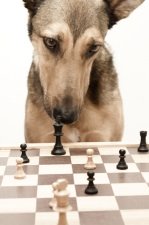Dog Intelligence
We
all know that dogs are smart. But did you know they can count? Or that
they have the mental ability of a child between 2 and 2 1/2?
Animal Intelligence
Animal behaviorists, vets, and university
studies
determine dog intelligence by putting different purebreds through a
variety of problem solving drills. The more quickly they figure it out
or pick up a skill, the higher they rank on the "smart scale." Dog
intelligence is the ability of a dog to learn, think, and solve
problems without human intervention. Leading canine researcher, Stanley
Coren, PhD, of the University of British Columbia, has concluded that
dogs can solve complex problems and are more like us than previously
thought.
 German
Shepherds are the best all-around working dog.
They may not be the best in any one specific task (ie guarding,
herding, tracking and scent trailing), but they are the most versatile
dog breed ever created. German
Shepherds are the best all-around working dog.
They may not be the best in any one specific task (ie guarding,
herding, tracking and scent trailing), but they are the most versatile
dog breed ever created.
Dog Intelligence Test
A variety of dog intelligence test studies
attempt to
confirm the ability of dogs to learn different tasks. Animal
psychologist Juliane Kaminski's paper in Science showed that Border
Collie Rico could learn over 200 words. And he could remember the names
of items for up to four weeks after exposure. Rico understood compound
sentences, such as "fetch the sock" versus simply saying "sock." And he
could give the sock to a specified person.
Another Border Collie, Betsy was featured in
2008 on the
cover of National Geographic magazine for her recognition of over 340
words. Betsy had the ability to distinguish the correlation between an
unknown image in a photograph versus the actual object.
 Ethologist
Frans de Wall, in his 1996 book, Good
Natured: The Origins of Right and Wrong in Humans and Other Animals
Ethologist
Frans de Wall, in his 1996 book, Good
Natured: The Origins of Right and Wrong in Humans and Other Animals , portrayed
an
experiment on guilt and reprimands. The subject,
a female Siberian Husky, liked to shred newspapers and was scolded when
her owner returned home to find the mess. After scolding the husky
would act guilty. But, when the owner shredded papers himself, without
the dog's knowledge, the dog would exhibit the same guilty behavior as
when she had made the same mess. , portrayed
an
experiment on guilt and reprimands. The subject,
a female Siberian Husky, liked to shred newspapers and was scolded when
her owner returned home to find the mess. After scolding the husky
would act guilty. But, when the owner shredded papers himself, without
the dog's knowledge, the dog would exhibit the same guilty behavior as
when she had made the same mess.
De Waal concluded that the 'guilt'
shown by dogs is not true guilt. Rather, it is the anticipation of the
behavior of an angry superior in a given situation.
It is thought that dogs can also feel
complex emotions
like jealousy, as they get in between their owners and other sources of
attention.
Klaus is a 2 year old German
Shepherd that was taught to read by her owner, Rita
Parr.
School psychologist Kathy Coon created the
first
intelligence test for dogs in 1976, which was continually revised
through 2003. Developed assessments tested ability to adapt, agility,
problem solving, short term memory and unique detour problems. It also
measured how the dog reacts to conditions considered unacceptable.
Performance of individual dogs was compared to the behavior of the 100
plus dogs on which the test was standardized. Coon's book, Dog
Intelligence Test ,
established
norms for dog breed intelligence. ,
established
norms for dog breed intelligence.
Intelligence Ranking of Dog Breeds
Data collected from over 200 dog obedience judges in Canada and the US
showed differences in working and obedience intelligence of different
breeds. In a ranking of the smartest dog breeds, "Border collies are
number one; poodles are second, followed by German shepherds. Fourth on
the list is golden retrievers; fifth, dobermans; sixth, Shetland
sheepdogs; and finally, Labrador retrievers," said Coren.
Three Types of Dog Intelligence
- Adaptive Intelligence (specific to the
individual
animal).
- Instinctive Intelligence (specific to the
individual
animal)
- Working/Obedience Intelligence (breed
dependent)
The breed of a dog can determine some of its
mental
capacity. Coren says, "There are three types of dog intelligence:
instinctive (what the dog is bred to do), adaptive (how well the dog
learns from its environment to solve problems) and working and
obedience (the equivalent of 'school learning')."
The average dog can learn 165 words. "Super
dogs," or
those in the top 20 percent, can learn 250 words. Coren says, "The
upper limit of dogs' ability to learn language is partly based on the
study of Rico who showed knowledge of 200 spoken
words and demonstrated 'fast-track learning,' which scientists believed
to be found only in humans and language learning apes."
 Coren says dogs can count up to four or
five. They also
have basic understanding of arithmetic. In simple computations, such as
1+1=1 or 1+1=3, dogs can discern that they are incorrect. Coren says dogs can count up to four or
five. They also
have basic understanding of arithmetic. In simple computations, such as
1+1=1 or 1+1=3, dogs can discern that they are incorrect.
He looked at four studies that showed how
dogs solve
spatial problems. Using observation, dogs learn where valued items
(toys or treats) are located, better environmental routes (fastest way
to a favorite lounging spot), how to operate mechanism (latches or
basic machines) and meanings of words and symbolic concepts (by
listening and watching).
During play, dogs are capable of
deliberately trying to
deceive other dogs and people in order to get rewards, said Coren. "And
they are nearly as successful in deceiving humans as humans are in
deceiving dogs."
***z-dogtimemedia300x250.shtml***

The information and
products recommended by german-shepherd-lore.com are not intended to
take the place of expert veterinarian care. Please consult with your
vet and ask about using a natural and alternative approach for the
healthcare and treatment of your pet. Find a holistic vet.
|

